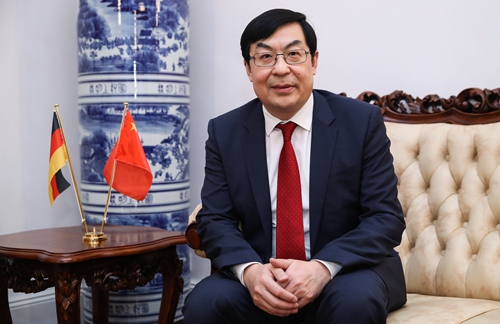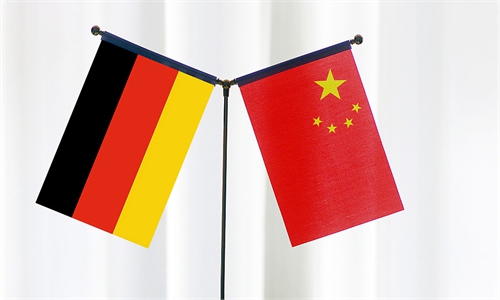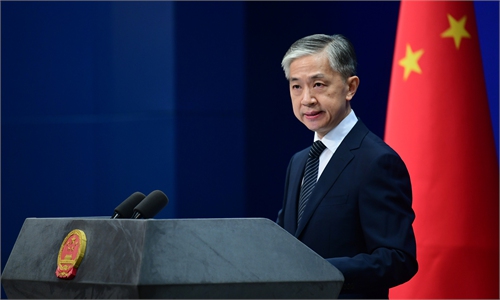China-German relations will continue moving forward during adjustments, boosted by BRI: senior diplomat
Germany, China prepared to advance BRI cooperation

Wang Weidong, minister and chief of the Economic and Commercial Department at the Chinese Embassy in Germany Photo: Courtesy of the Chinese Embassy in Germany
Editor's note:Chinese President Xi Jinping spoke on the phone with Germany's new chancellor Olaf Scholz on December 21, 2021, in which the two leaders pledged to advance the China-Germany traditional friendship and cooperation, maintain close communication on strategic issues and jointly defend multilateralism in international affairs.
It was the first conversation between the two leaders after Scholz formally took office, marking an end to Angela Merkel's 16 years as leader.
In an exclusive interview, The Global Times' Li Xuanmin talked with Wang Weidong, minister and chief of the Economic and Commercial Department at the Chinese Embassy in Germany, on issues ranging from political and economic cooperation to the Belt and Road Initiative (BRI) cooperation.
GT: During the phone call between President Xi and Chancellor Scholz, it was noted that the strengthening of China-Germany cooperation within the framework of the BRI will benefit countries along the route and promote connectivity between Asia and Europe. What is the current state of investment and connectivity of BRI in Germany?
Wang: I have observed that in recent years, everyone from all walks of life in Europe has been discussing the "Silk Road." The EU's recent Global Gateway initiative has also been interpreted as an effort to match up with the BRI. This just shows that BRI, proposed by China in 2013, is very far-sighted, conforms to the historical trend and meets actual needs, and the vision of promoting the inter-connectivity among countries also contains huge potential for international cooperation.
Of course, I also hope that the EU's Global Gateway initiative is to genuinely provide financing and support for the construction of infrastructure in developing countries, as well as genuinely improving the infrastructure in those countries.
Currently, the most fruitful project for China-German co-construction of the BRI is the China-Europe Railway Express. Since the successful opening of the first China-Europe train in March 2011, Germany has become the most important destination for the China-Europe Railway Express. Meanwhile, as a growing logistics channel, the CR Express has favorably supported China-Germany and China-EU bilateral trade. In particular, bucking the impact of the pandemic, shrinking global trade and logistics hurdles, the volume of trade between China and Germany in 2020 still managed to grow by 4.3 percent, and it is expected that China-German trade volume will reach a new high in 2021.
It is worth noting the spillover effect of the China-Europe Railway Express. Take the Port of Duisburg as an example. There are more than 60 regular trains between the port and nearly 20 Chinese cities every week. The German city carries about 30 percent of total cargo shipment of CR Express.
Thanks to flow of trade, Duisburg has attracted an increasing number of Chinese-funded enterprises to invest and start businesses, which in turn promoted the development and employment of local related industries. Two-way cultural exchanges are also enhanced, more and more international students are going to University of Duisburg-Essen.
I also want to mention that the CR Express not only serves as the "steel camel," it is also the "life channel" during the coronavirus pandemic. Over 8 million medical items were transported through the CR Express to countries along the route, including Germany. There is an old German saying, "mountains never greet, but friends may meet." I think CR Express is in this way a connection of friendship.
Over the past eight years, the BRI has been highly recognized and supported by countries along the route, and this fact lays a solid foundation on which China and Germany can expand cooperation.
I believe that as long as the German side abandons its ideological prejudices and adheres to the principles of mutual respect, mutual benefit and win-win results, China and Germany will have plenty to do in deepening cooperation and jointly constructing the BRI.
GT: During Merkel's time in office, China-German bilateral relations were generally stable. After German Chancellor Schultz took office, the new German government has not yet formed a consensus on its China policy. How will China-German relations develop in the future? What is the current attitude of the new German government toward China? What role will bilateral economic and trade relations play in the overall relationship and how will it affect Germany's China policy?
Wang: The new German administration practically follows EU's narrative on its China policy. EU's arguments of "competition, cooperation and confrontation" on China-EU relations conflict and offset with each other. I believe that "understanding, respecting and cherishing" is the correct way to get along between China and Germany. The self-contradictory positioning of bilateral relations will inevitably lead to policy confusion. We can see how this will develop.
However, now there is the first three-party coalition government in German history, and the parties within this government still need time to break in, and the ability of the Chancellery to control the overall situation needs further observation.
In the early days of the new administration, some adjustments in its China policy are to be expected. It may be inevitable that bilateral relations will enter a period of turbulence and friction. However, China and Germany share extensive common interests and shoulder global responsibilities in promoting post-pandemic economic recovery, fighting COVID-19, tackling climate change, alleviating poverty and maintaining and reshaping the multilateral order. A continued deepening of the bilateral relations is not only beneficial to both sides, but also to the world. Therefore, I believe that China-German relations will continue to move forward during adjustments, and there will be no fundamental and directional changes.
GT: During the leaders' phone call, it was mentioned that the two sides should actively explore new areas of cooperation. What do you think is the potential of China-Germany cooperation in new areas of cooperation such as new energy, green and digital economy, and in which areas can the two sides deepen cooperation in the post-virus era?
Wang: I want to answer this question from two aspects. First, the continued opening of the Chinese market shows that China is willing to share more development opportunities with countries around the world, including Germany. At present, the two-way investment between China and Germany is mainly concentrated in the manufacturing industry, especially in the automotive sector.
However, as China continues to open up, the services market has gradually become a highlight for German investment in China. The Business Confidence Survey released by the German Chamber of Commerce in China (AHK) last year pointed out that the services sector accounted for over 75 percent of German companies' investment in China in 2020.
I believe with the further opening-up of the Chinese market, especially the new measurements introduced in the services industry in the pilot free trade zone, the cooperation between the two countries will usher in many new growth points. I also want to use this chance to call on the German side to provide a fair business environment for Chinese companies to invest in Germany. We hope that the German government also looks at China's development and Chinese companies' investment in Germany with a more open mind. This is also in the interests of the long-term development of the German economy.
Secondly, I think the potential of the bilateral cooperation lies in the international level. In the post-pandemic period, the two countries have important development opportunities and far-reaching prospects for cooperation in the fields of energy transition, green and low-carbon, and digital economy, etc. Take the new energy sector as an example. The three major German car companies, Mercedes-Benz, BMW, and Volkswagen, are all deploying electric vehicle production in China, and technologically advanced Chinese companies such as CATL have also invested and built factories in Germany to serve European customers more effectively. These cooperation shows that the companies of the two countries are optimistic about the cooperation in the realization of green development.



